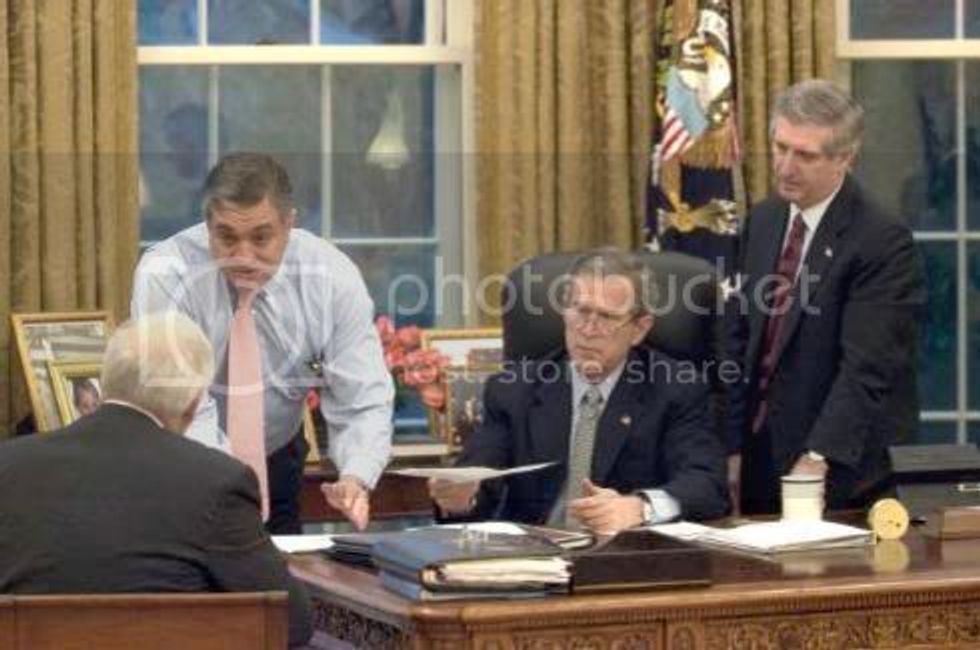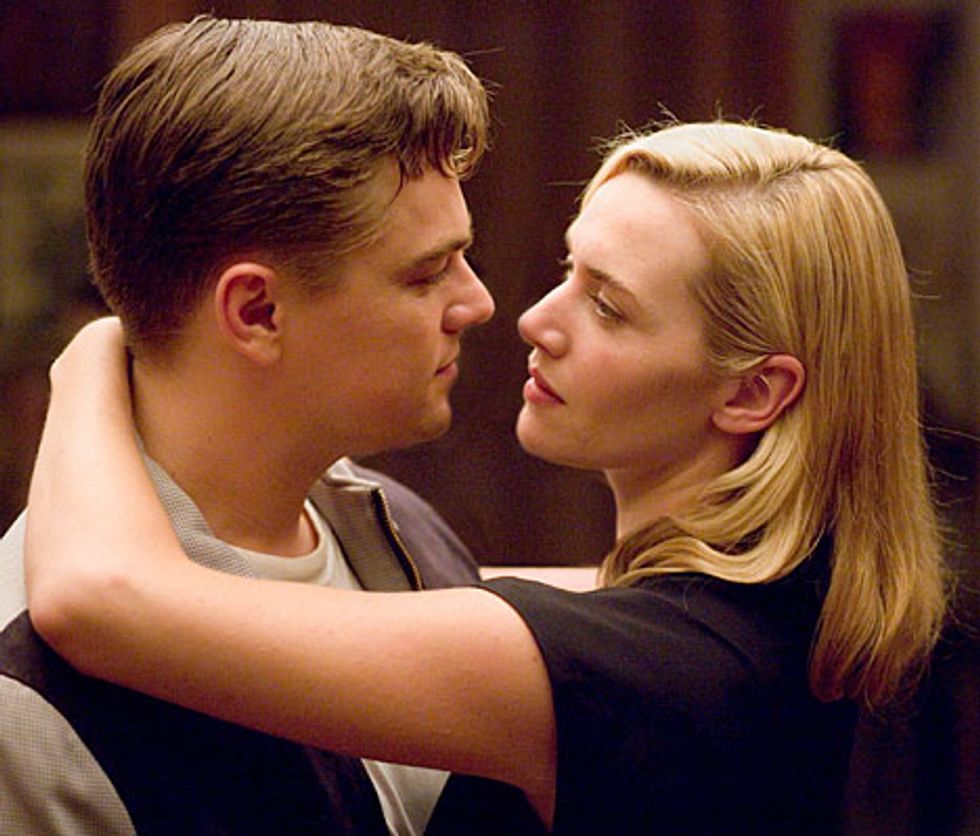Some critics (like Roger Ebert) loved "Revolutionary Road", calling it a near flawless film and rightfully falling all over themselves to praise Kate Winslet and Leonardo DiCaprio's performances, the sort where the actors immerse themselves so thoroughly in the character that it's sort of scary. In fact, I'd say that the only thing I'd really change about the movie, having seen it last night, is the atrocious score, which was a major problem in Sam Mendes' much more beloved film "American Beauty". There were at least 5 separate scenes where merely taking the music out would have made a powerful difference, especially the dancing scene in the bar, where the film score swells in and the swing band in the background is drowned out, when the swing music would have been so much more effective. But on the whole, a minor quibble.
"Revolutionary Road" is way better than "American Beauty". There. I said it. It's probably because Mendes is working from the lost classic by Richard Yates from 1962 by the same title, a book that I think had a profound impact on the show "Mad Men", and confirming to me that the best way to tell these sorts of stories is to immerse yourself in works of art mining the same territory but from the actual era they're critiquing. The Alan Ball script for "American Beauty" had a loose nature to it, with lots of scenes that felt profound but weren't (plastic bag *cough*), and this script is based on a novel that deliberately dispenses with quaint little pseudo-profoundities. "American Beauty" had a lot of scenes that didn't quite make sense upon reflection, whereas everything in this film fits together nicely. The plastic bag in this story is a man on a day leave from an insane asylum whose main problem is speaking truth, but as a device it works much better because you find yourself truly unnerved by the guy. The plastic bag in "American Beauty" made me scratch my head and I suspect, to this day, that most people who praise that scene figure that everyone else saw something deep there and they don't want to be left out, so they faked getting it until they felt like they really did. But no, it's really not that deep.
The two movies demand comparison, not just because they're the same director, but they have a similar plot structure and themes and even color scheme (except this movie is beige where "American Beauty" is gray). But for some reason, a lot of critics compared this movie unfavorably to "American Beauty". Like this vicious review from Ty Burr at the Boston Globe:
The drama of "Revolutionary Road" isn't much, which is to say it's the stuff of "real life": the Wheelers fight like alley cats, decide to relocate to Europe, get bogged down by inertia and Frank's confused ambitions. Some in the audience may object to paying for what they can get at home for free.
He praises the novel, but I suspect mostly because dissing that, too, would undermine his authority. But Burr can't decide what it is that he hates about this movie---is it too much like real life, or is it a cliche about the 50s? That he lobs these contradictory accusations at it exposes both why so many story tellers in our society keep drifting back to the 50s and 60s, and why this movie offends so many people that lapped up the intellectually shallow "American Beauty". The myth of the "Leave It To Beaver" 50s still holds sway, and so it hasn't yet lost its power to point out that the people then, despite their houses and clothes and quaint ideas, were just like us, and in fact we haven't really come as far on issues of sexism and racism as we'd like to believe we have. The Wheelers yell the word "fuck" at each other. They have those ugly, house-shaking fights that are still common and still hidden. Few filmmakers have the guts to show marital strife in all its ugliness and screaming, and prefer instead to represent it as stony silences, which I suspect are less common in reality. The audience I saw the movie with wasn't bored because they can get it at home. They were shocked, because the fighting went so strongly against movie cliches and did reflect real life. In fact, I'd say what made this movie so compelling was that it shoved back against cliches about the 50s. Frank has a cliched affair with a secretary, but when he reveals it, it not only goes much differently than how you expect, it causes you to question the sadism of certain cliches like the Big Reveal. It creates uncomfortable questions about how much we allow Hollywood cliches to sculpt our own lives.
Both movies deal with the depravity of suburbia, but the big difference in themes is how differently they approach the cult of masculinity. "Beauty" revels in it. Spacey's character drives a muscle car and lifts weights, and instead of this making him pathetic, we're supposed to admire him. The implications of the cult of masculinity are pushed to the margins. Spacey fantasizes about an affair with a nubile virgin, but when faced with the reality, he does the right thing and is some sort of heroic model of self-restraint. (If it wasn't written that way, egomaniac Spacey plays it that way.) The other horrors of hyper-masculinity are pushed onto the villainous neighbor, and we're left wondering if the reason that he hates Spacey is he's jealous of Spacey's ease with being a man of holy masculine heterosexuality.
In contrast, "Revolutionary Road" lays waste to all the cowardly crutches of "Beauty". Living is not equated with the cult of masculinity, and in fact, one reason that Frank handicaps his and April's attempts to get out of the stifling suburban life is that he fears that it's emasculating to abandon the warm patriarchal blanket he's wrapped himself in. Frank's no big hero protector of nubile virgins---he actually goes through with it when faced with temptation and his lack of regard for the woman he fucks is, once again, an uncomfortable truth that "Beauty" avoids facing. The movie is a withering critique of the masculinity myth, and it's hard not to flinch when characters reference it directly with open statements about the characters' beliefs in male superiority and female hysteria, and the Falstaffian character wryly noting that men make a big deal out of pregnancy because it makes them feel powerful. Frank Wheeler has all the masculine crutches that Spacey's character embraces in "Beauty", and they're not only not evidence that he's got a spark, they're evidence that he never had much of a spark to begin with.
Which is why Burr's critique of DiCaprio's performance misses the point:
Part of the problem is DiCaprio, who seems too callow for his role even at 34 (Winslet looks like she could lick him with one hand tied behind her back). Without Yates dissecting his inner motivations into their constituent molecules, Frank is a much thinner character.
The energy and liveliness gap between Frank and April Wheeler is there by design, not accident. Frank Wheeler sucks, and the climax of the movie comes when April Wheeler, who has spent her whole adult life pretending her husband is what she wants him to be, finally sees Frank for who he is---a fast talker with no depth and no courage. This realization drives the novel, as well, though the novel is able to lull you into thinking that Frank's the good guy in the marriage, and slowly but surely you realize that April is actually the only one with any sense or life to her. Mendes makes this more April's story from the beginning, and instead of a comfort food story about a man oppressed by the harpies of suburban conformity, you get a much more disturbing story about how a man can slowly squeeze the life out of a woman. There's a scene in "Beauty" where Kevin Spacey asks Annette Benning what happened to the girl he fell in love with, and we're all supposed to feel sorry for him that she didn't try harder for him. In "Road", the tables are turned (and much more realistic), and you have to deal with the fact that suburban conformity didn't just happen, but it exists in no small part because the suburbs make nice little containers for women that men would like to control. It's not a feminist parable or anything, but it does lay waste to the neat little sitcom-esque myth that men are so oppressed by nattering women, a myth that "American Beauty" trafficked in.
This review is long already, but I'd be remiss if I didn't address what I'm sure people are dying to talk about, which is the way that abortion is handled in the movie. You can't avoid it, since it drives the plot of the book. The fear is that Mendes would do what almost everyone in film and TV does, which is to bring up the idea of choice, but then to hastily reassure the audience that women who have abortions are immoral or, at best, pathetic. Mendes doesn't give into this urge, and even though the abortion ends horribly for April, we're never led to believe for a moment that she was wrong in doing what she did. In fact, I'll say he did the book justice and plays the abortion exactly how it happens in the book. Frank's nonsense about how a woman must be broken if she doesn't want to have another baby sounds as ridiculous as it is. The hints that abortion could be used to diagnose April as mentally ill draw a parallel between her situation and that of their friend's in the insane asylum---are they both considered crazy because they see the world as it is? Most of the movie is a washed-out beige, and so when we see the blood stain spreading on April's dress, it actually pops out as this rare moment of actual beauty, and it's a rare sign of real life invading the suburban bubble. Without hammering at the point, the blame for her death is not on her shoulders for wanting to abort, but because of the illegality of the procedure and the stalling at the hands of her husband. So, enjoy it for that, because it'll probably be a long time coming before we see another responsible portrayal of abortion onscreen.





 Just when you thought the tired Oklahoma bigot State Rep.
Just when you thought the tired Oklahoma bigot State Rep. 
 I'm
I'm  Case in point: Within minutes after swearing in, President Obama had the
Case in point: Within minutes after swearing in, President Obama had the  Man, this is what I get for traveling for a couple of days and not reading blogs. I finally caught up last night, and saw that I had missed
Man, this is what I get for traveling for a couple of days and not reading blogs. I finally caught up last night, and saw that I had missed 

 Spoiler warning, though if you can't tell from the preview that this movie is going to end in tears, I don't know what to do for you.
Spoiler warning, though if you can't tell from the preview that this movie is going to end in tears, I don't know what to do for you.